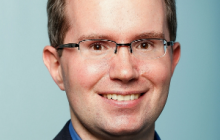U.S. Federal Communications Commission CIO Dr. David Bray has landed a new role: Chief Ventures Officer for the National Geospatial-Intelligence Agency (NGA). We asked him to share some advice for other CIOs looking to take on new C-suite roles, and give us a peek at what his new role, focused on business model transformation, will involve.
[ Editor’s note: In August, after the publication of this article, in true "change agent" fashion, Bray announced a change in his career plans. Instead of joining the NGA, Bray will be consulting and serving as executive director of the People-Centered Internet coalition, working with PCI chairman and co-founder Vint Cerf. For more details, see Meritalk.com’s coverage which includes this from Bray: “While I had previously planned to start a different government role this summer, the opportunity to join the People-Centered Internet coalition as Executive Director represents a once-in-a-lifetime opportunity to work with the tremendous PCI Board and Team to advocate, share expertise, and identify projects to demonstrate how the Internet can be more people-centered.” We hope to publish an article on Bray’s new PCI role later this year. ]
The Enterprisers Project (TEP): As Chief Ventures Officer for the National Geospatial-Intelligence Agency, what will your main jobs be?

Bray: NGA represents an interesting intersection of different missions, to include defense in support of the U.S. military, intelligence in support of national security, and civilian in support of open data and geo-imagery both for routine and crisis situations. For example, NGA helps provide geo-imagery to help vessels avoid piracy in international waters. This role will involve changing the agency's business processes and behaviors to shift from mapping the world to "mapping and modeling the world."
My specific role as Chief Ventures Officer will be that of an "internal and external venture capitalist," championing positive change agents from across the community to help transform the organization. Our new opportunities involve open data and commercial geo-imagery, collaborative models of our world, and accelerating the introduction of automation and artificial intelligence. The expectation is a lot of this will be done by public-private partnerships and open data efforts.
TEP: Will you be greenlighting new AI and other tech projects inside the agency, saying yes much as a venture capitalist would greenlight a software startup idea?
Bray: Yes, definitely. As Chief Ventures Officer, I'll serve as lead instigator and champion of change agents at NGA, while at the same time having mechanisms to spotlight new ventures and new avenues of exploration. A central goal for the new role includes creating a process where folks from both inside and outside the organization know what types of projects we're looking for, have mechanisms to make pitches and give demos, and if selected, receive resources, expertise, or a spotlight to help incubate and scale their efforts. My goal is to cultivate a balanced portfolio of initiatives that ranges from blue sky to more immediate transformational activities all linked to delivering results differently and better.
TEP: Does this agency have a CIO, and if so, how will you work together?
Bray: Yes, NGA has a CIO and also has a Component Acquisitions Expert, a Chief Human Capital Officer, and several mission area leaders. My role will be there to amplify collectively what they are doing to help transform NGA, to include helping with connections when a new venture involves a combination of faster acquisition, new technology, and changes in how the workforce are required to deliver superior mission products and capabilities.
Much like how we operated at the FCC, I'll still be digital diplomat and "human flak jacket" for transformation, now with additional levers and resources to help make it happen. These ventures are being done across the enterprise and on mission-relevant activities, not in some unconnected office.
TEP: How do you expect your new CVO role to differ from your previous CIO roles?
Bray: The Chief Ventures Officer role will stretch my leadership abilities further in directing new public-private partnerships, adoption of machine learning and artificial intelligence, as well as changes in NGA's mission processes, workforce, and acquisition models. The role will present an entirely new set of opportunities for me to listen, learn, and champion even more positive change agents across a 15,000-plus person joint military, intelligence, and civilian organization. It will be the first role of its kind in the U.S. Government focused on completely transforming the business model of a large organization.
As a leader, I'll be expecting the change agents I'm championing to push the envelope and deliver new capabilities. Whereas the motto in Silicon Valley might be “fail fast and fail often,” such a model is not going to work for public service. The only way public sector organizations can gain the expertise needed to respond to and take advantage of the digital disruptions occurring globally will be to do “dangerous experiments” as positive change agents, akin to what entrepreneurs also do.
TEP: For other CIOs aspiring to new roles inside the C-suite, what skills helped you make the leap?
Bray: For CIOs to make the leap to new leadership roles in the C-Suite, first, recognize that there are no "just IT" projects anymore – only mission or business projects with "IT baked-in." This represents a crucial shift in mindset. Savvy CxOs who also bring a balance of empathic leadership and entrepreneurism can become strategy and new venture leaders for their organizations.
I want to underscore the importance of listening and learning from the existing workforce when seeking to help transform it. Helping the organization adapt to the shifting future of work is everyone’s responsibility. Expertise only comes from experiments, and thus all C-suite leaders must recognize the need to deliver results by using existing business models while also experimenting with new and better ones in parallel.






Comments
inspiring leader and champion of change agents. dr. bray leads the way!
Having worked with Dr. David Bray in the past I can attest that he is both an empathic and an energetic leader, he encourages and challenges teams of people to tackle hard problems. One team, one mission is one of his favorite mantra.
I agree with David's assertion that CIO's must recognize that there are no "just IT" projects anymore – only mission or business projects with "IT baked-in". The CIO must become the C-Suite "Change Agent" for efficient and effective business and mission-related processes and procedures, less the organization will continue to "pave the cowpaths" and not gain maximum value from automation.